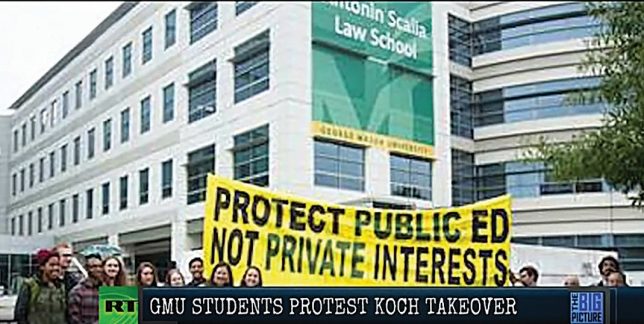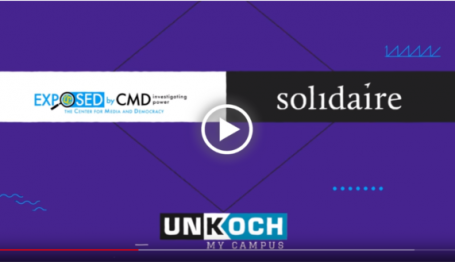Organization Trends
Unclear Funding for UnKoch: Masking Funders Through Essential Information


Unclear Funding for UnKoch (Full Series)
Campus Activists Create a Boogeyman| Masking Funders Through Essential Information| Live and Let Them Give
[Disclosure: The author participated in the Charles Koch Institute’s Koch Associate Program in 2015-2016, which is funded by the Charles Koch Foundation. The Capital Research Center is a partner in both the Koch Internship and Koch Associate Programs.]
Summary: UnKoch My Campus prematurely claimed a victory in May when donor agreements between George Mason University and the Charles Koch Foundation revealed the extent to which the foundation controls its university investments through grants. But before UnKoch My Campus throws stones about “dark money,” it needs to come clean about its funding and agenda.
Watch our video about UnKoch’s hypocritical maneuvers to suppress intellectual diversity here:
Because UnKoch is legally a project of Essential Information and not its own nonprofit, it does not file a distinct tax return (known as a Form 990) with the IRS. Looking at its parent organization doesn’t tell the public much about who is pulling UnKoch’s financial strings. But it offers a few clues.
According to Foundation Search, since 2014, Essential Information has received grants from the Tides Foundation, which is famous for its ability to funnel money from influential donors to radical organizations while protecting the identity of the original giver. CMD has also received gifts from Tides and similar pass-through funding vehicles; when conservative and libertarian donors employ such methods, CMD denounces the contributions as “dark money.”
Tides isn’t the only such entity contributing to Essential Information: The group has received gifts from the Bank of America Charitable Gift Fund as well. In 2015, UnKoch also received a grant from the Solidaire Network, which funds progressive direct-action organizations and has close ties to the liberal donor network Democracy Alliance. Solidaire has a number of giving vehicles to help donors fund new organizations and put infrastructure into fledgling movements.
UnKoch also solicits individual donations on its website. An old “join us” page on the UnKoch Website directs donors to a 404 error page—the defunct URL shows: “https://centerformediaanddemocracy.salsalabs.org/unkochmycampus/index.html.” This suggests that at some point, Center for Media and Democracy was handling at least some of the funds for the UnKoch campaign. At the bottom of this page, UnKoch dubiously mentions:
*Anybody listed on our Staff page as an employee of a partner organization, such as Greenpeace USA or the Center for Media and Democracy, is paid by their respective employer and not by any grants made to UnKoch My Campus.
Your support goes directly to people solely focused on this campaign. Thank you!
Donations in Context
Education is one of America’s favorite philanthropic sectors. Giving to higher education exceeds $40 billion a year. When UnKoch and its Greenpeace, union, and CMD “partners” denounce the influence inherent in charitable giving, they fail to put CKF’s generous $60 million in context with the rest of American higher education gifts. The Ford Foundation alone gives ten times what the Koch Foundation does in a year to higher education. Yet the Left is not urging universities to reject grants from Ford.
Perhaps that’s because Ford funds the “right” kind of programs. The Ford Foundation pioneered the first women’s studies programs by giving gifts to colleges and universities. The first wave of grants were successful, but many educators wanted more. Feminists wanted the coursework sprinkled throughout the curriculum. So, in 1989 Ford gave away another $800,000 in grants to universities to “integrate research and teaching on American minority women into undergraduate courses in the liberal arts.”
In light of this obviously ideological philanthropic strategy by one of the largest liberal foundations in existence, on what grounds should Charles Koch, who supports classical liberalism and free markets, be prohibited from funding centers and programs exploring these very ideas? Economics is the most overlooked subject in undergraduate curricula, and programs like the Koch-supported ones at George Mason are poised to reduce the very real crisis in American economic illiteracy.
Likewise, left-wing education groups (like, to choose one at random, the American Federation of Teachers) decry decreases in government education spending, but when the wrong entrepreneur gives back to higher education, they cry foul and instigate protests at the expense of a campus’s academic freedom and intellectual diversity.
UnKoch maintains that CKF is hostile to academic freedom and what’s worse, that the foundation subscribes to a shadowy theory of social change. (UnKoch may want to update their website, because CKF has a new and better articulated public website describing how the foundation views societal problems—and their solutions.) Of course, the Ford Foundation—which made grants to Essential Information as recently as 2015—also is interested in strategic giving and creating theories of social change. So does the Solidaire Network. (“Social change” is, frankly, just a buzzword used by philanthropy wonks for ideologically motivated changes to public policy.) Given its penchant for economic study, CKF has a slightly wonkier vision, but it is far from malicious, and is no cause for universities to turn away opportunities to expand their offerings or enhance their campus’s reputation for producing research.
In the conclusion of Unclear Funding for UnKoch, learn why the academy is better off with all points of view represented on college campuses.

